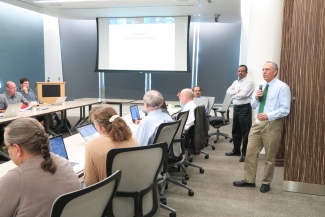On 8-9 November 2016, more than 80 scientists from a broad cross-section of the physics development community gathered for the Next Generation Global Prediction System (NGGPS) Atmospheric Physics Workshop at the NOAA Center for Weather and Climate Prediction. The workshop provided an opportunity for the NGGPS Physics Team to revisit and refine its near- and long-term priorities for advancing the National Centers for Environmental Prediction (NCEP) global physics suite and identify key areas that need attention. Current plans are to deliver the advanced physics suite by October 2018.
Workshop participants proposed the following approaches to advance NCEP’s global physics suite:
- Upgrade the radiation code to RRTMGP, a restructured and modern version of RRTMG (Rapid Radiative Transfer Model for Global Climate Models), to allow more interactions between advanced schemes, such as different radiative processes for separate distributions of cloud ice and snow, and to significantly increase the speed of this computationally costly component of the physics.
- Determine an approach for selecting a microphysics scheme from a list of strong candidates that meets NGGPS priorities/goals and proceed with an open selection process. This approach should include both testing metrics and an assessment of how the scheme would set up the physics suite for future advancement. General consensus of the breakout group discussions was that the Thompson scheme is a strong candidate for NGGPS testing.
- Convection and boundary-layer schemes would follow the idea of having an evolved suite and an advanced suite that can be compared with suitable metrics. It is recognized that decisions regarding these physics components need to be taken in the context of a suite with other candidate components.
- The land-surface model will include updated data, and will evolve based on process studies for individual components. The final model will likely come from selected Noah-MP options.
The workshop discussions laid the groundwork for a collaborative framework that will allow the research and operational communities to efficiently and effectively accelerate the advancement of NCEP’s global physics suite. At the center of this framework is the Interoperable Physics Driver (IPD)/Common Community Physics Package (CCPP) concept and a clearly defined and documented systematic process to select and advance innovations that define the composition of future operational physics suites.
While the workshop discussions made great strides towards defining the key aspects of this collaborative framework, many of the details of the decision-making process still remain to be defined and vetted. As these final details are worked out, it will be imperative to make sure the process is open and transparent, and takes into account the needs of both the research and operational communities.
